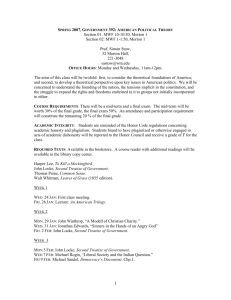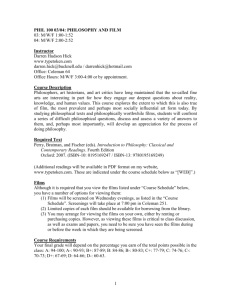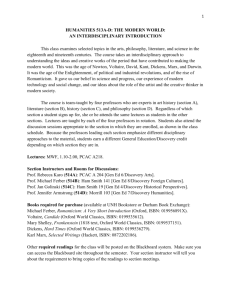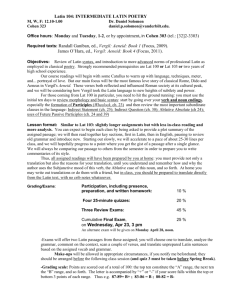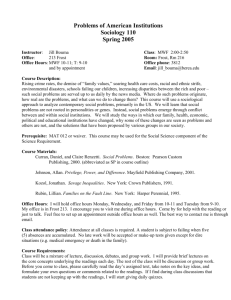African American Literature of Slavery/Freedom
advertisement
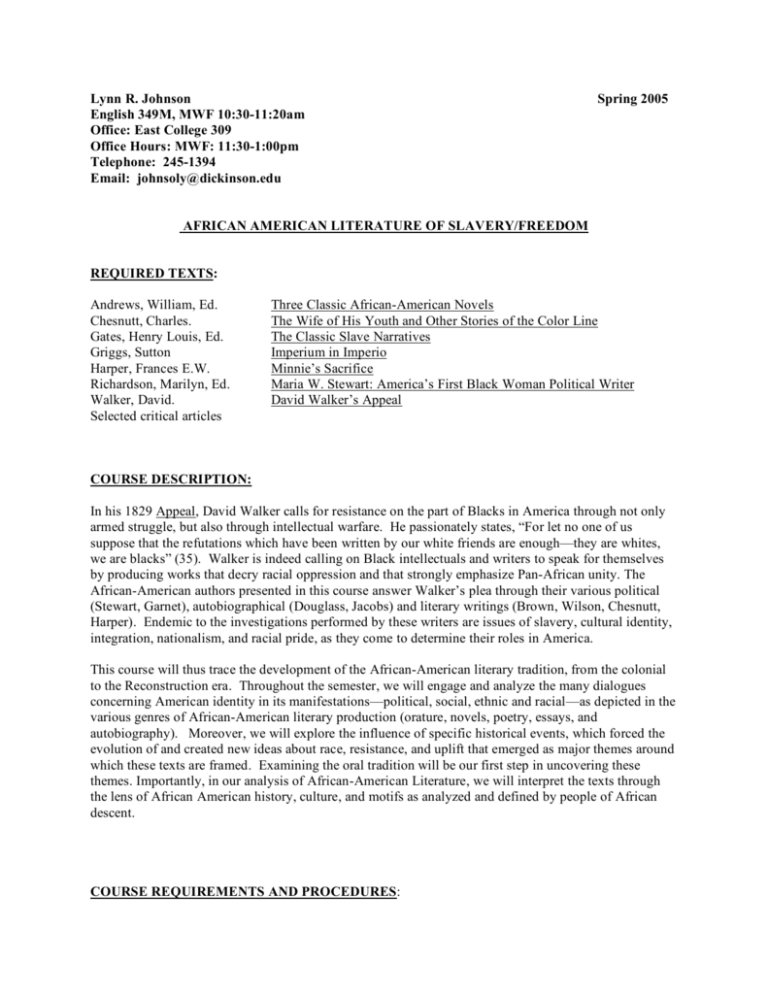
Lynn R. Johnson English 349M, MWF 10:30-11:20am Office: East College 309 Office Hours: MWF: 11:30-1:00pm Telephone: 245-1394 Email: johnsoly@dickinson.edu Spring 2005 AFRICAN AMERICAN LITERATURE OF SLAVERY/FREEDOM REQUIRED TEXTS: Andrews, William, Ed. Chesnutt, Charles. Gates, Henry Louis, Ed. Griggs, Sutton Harper, Frances E.W. Richardson, Marilyn, Ed. Walker, David. Selected critical articles Three Classic African-American Novels The Wife of His Youth and Other Stories of the Color Line The Classic Slave Narratives Imperium in Imperio Minnie’s Sacrifice Maria W. Stewart: America’s First Black Woman Political Writer David Walker’s Appeal COURSE DESCRIPTION: In his 1829 Appeal, David Walker calls for resistance on the part of Blacks in America through not only armed struggle, but also through intellectual warfare. He passionately states, “For let no one of us suppose that the refutations which have been written by our white friends are enough—they are whites, we are blacks” (35). Walker is indeed calling on Black intellectuals and writers to speak for themselves by producing works that decry racial oppression and that strongly emphasize Pan-African unity. The African-American authors presented in this course answer Walker’s plea through their various political (Stewart, Garnet), autobiographical (Douglass, Jacobs) and literary writings (Brown, Wilson, Chesnutt, Harper). Endemic to the investigations performed by these writers are issues of slavery, cultural identity, integration, nationalism, and racial pride, as they come to determine their roles in America. This course will thus trace the development of the African-American literary tradition, from the colonial to the Reconstruction era. Throughout the semester, we will engage and analyze the many dialogues concerning American identity in its manifestations—political, social, ethnic and racial—as depicted in the various genres of African-American literary production (orature, novels, poetry, essays, and autobiography). Moreover, we will explore the influence of specific historical events, which forced the evolution of and created new ideas about race, resistance, and uplift that emerged as major themes around which these texts are framed. Examining the oral tradition will be our first step in uncovering these themes. Importantly, in our analysis of African-American Literature, we will interpret the texts through the lens of African American history, culture, and motifs as analyzed and defined by people of African descent. COURSE REQUIREMENTS AND PROCEDURES: 2 Class participation 15% Oral presentation 20% Journals/Quizzes 10% Paper 1 25% Paper 2 30% _______________________________________________________________________ 100% Class Participation/Oral Presentations: This course will rely heavily on class discussion; therefore, your participation is important in exchanging and challenging ideas. Thoughtful contributions to class discussions will be reflected in your grade and in some cases determine whether you pass the class. In order to allow you to become more involved in the class discussions, you will sign up to lead the class on an assigned reading. Also included in class participation are absences and tardiness. Absences and Tardiness: You are allowed three (3) excused absences during the semester. Your fourth absence and every subsequent absence will lower your final grade one-half a letter grade. For example, if you have a B+ in the class, the fourth absence will lower your grade to a B. Also, excessive lateness is not tolerated and will adversely affect your grade. Late arrivals to class are inconsiderate and distracting to those already engaged in class discussion. You are permitted three (3) incidents of tardiness during the semester. Your fourth and subsequent lateness will also lower your grade one-half a letter. Conferences: Throughout the semester, I will be available for individual conferences. Each student must meet with me at least twice during the semester. These meetings are useful in gauging your understanding of material discussed in class and for you to express any problems with your written work or with the class in general. If you fail to come to a conference, it will count as an absence unless you notify me, by phone, at least one hour before the scheduled time or by e-mail before 10am. Journals/Quizzes: Students will complete journals (2.5-3 pages) that respond to issues raised in the reading assignments. These journals should offer thoughtful critiques and critical assessments of the arguments presented in the texts/critical articles. Responses are due in class on the assigned day and are collected. Students will be randomly called upon to read their journals on any particular day, in order to facilitate class discussion. Quizzes are also given throughout the semester to assure that students complete the reading assignments. Papers: All students are required to write one short paper (5-7 pages) and one longer paper (10-12 pages) on the readings assigned during the semester. If you do not meet the required paper length, your paper will receive an “F.” Moreover, papers may only be revised and handed back in if the grade assigned is a C and below. The final grade for a revised paper will be based on the average of the two papers. I do not accept late papers. Computer or printer problems will not be accepted as an excuse. Furthermore, 3 if you are absent on the day an essay is due, your paper still must be submitted to me on time and may be sent via e-mail. NO EXCEPTIONS! ALL of your work must be typed or computer generated. Using MLA format, your work should be double-spaced, with one-inch margins on all sides, and typed using a 12pt. font. Please include your name, course and section, instructor’s name, and date at the top left corner of the paper. Also, make sure that your title follows after the date; your title should be centered. Staple the pages together in the left corner. Evaluation of Papers: In assessing your papers, I will be evaluating and looking for: An original thesis statement Solid arguments that are supported by textual evidence. You must use MLA citation rules. Your ability to analyze texts, not merely offering a summary of the reading Your voice and your ideas, instead of simply restating or overusing the author’s words. Have faith in your ability to express yourself through academic language. A solid structure where your ideas connect smoothly by using transition sentences/paragraphs. Grammar and Punctuation Paper length (if under the required number of pages) It is important that you remember to take constructive suggestions to help improve your writing. Students who desire to discuss their papers with me must make an appointment and come with the list of issues/questions about my comments you wish to review. Paper grades are not negotiable! Plagiarism/Academic Cheating: Plagiarism entails stating verbatim or paraphrasing another person’s ideas and words in your work without acknowledging the person as your source. It also includes the unacknowledged assistance of another person in completing your work. Additionally, academic cheating involves turning in someone else’s work as your own, collaborating, without permission, on an assignment with another student, turning in a paper that you wrote for another instructor/ class, and completing another student’s work. Both plagiarism and academic cheating are not tolerated. Those who are found committing these infractions will receive an “F” in the course and will be reported for disciplinary action. Blackboard: All students enrolled in this class must register on Blackboard. On this site, you will find class handouts, essay topics, announcements as well as journal assignments. Also, in some cases I will place a quiz or quotes for explication on Blackboard; therefore, you should check this site on a daily basis. Lynn R. Johnson Spring 2005 4 Schedule of Assignments (subject to change) Mon./Jan. 24 Introduction to African American Literature Unit I: The First Modes of African Expression and the Oral Aesthetic Wed./Jan.26 Equiano, Interesting Life…. (Chapters 1& 2) Fri./Jan. 28 Equiano; Articles on Middle Passage Mon./Jan. 31 Work Songs: “Pick a Bale of Cotton” * “Go Down Old Hannah” Spirituals: “Walk Together Children”; “Motherless Child”; “No More Auction Block”; “Oh Freedom” *; Go Down Moses Wed./Feb. 02 Rhymes: “Me and My Captain”; “Promises of Freedom”; “Learn to Count” * Signal Songs: “Follow the Drinking Gourd” Fri./Feb. 04 Critical Perspectives: Gates, excerpt from The Signifying Monkey Ballads: “Sinking of the Titanic” Mon./Feb. 07 Student reports on African-America in the Early 19th Century Wed./Feb. 09 Student reports continued Wheatley, “On Being Brought From Africa to America”** Terry, “Bars Fight” ** Unit II: African American Polemics: The Calls for Resistance Fri./Feb. 11 Walker, Appeal Intro-Article 1 Mon./Feb. 14 Walker, Appeal Articles 2-3 Wed./Feb. 16 Walker, Appeal (Article 4-end) Fri./ Feb. 18 Garnet, An Address to the Slaves of the United States of America** Mon./Feb. 21 Stewart, Religion and the Pure Principles of Morality, the Sure Foundation on Which We Must Build; Lecture Delivered at Franklin Hall Wed./Feb. 23 Critical Perspectives: Peterson’s “Humble Instruments in the Hands of God: Maria Stewart…and the Economy of Spiritual Narrative”; Journal 1 Fri./Feb. 25 Student Conferences Unit III: Freedom Narratives: Autobiographical and Historical Renderings 5 Mon/Feb. 28 Douglass, The Narrative of the Life (Preface-Chapter 4) ESSAY #1 due by 7pm Wed./Mar. 02 Douglass, The Narrative of the Life (Chapter 5-Chapter 10, pg. 300) Student Presentation Fri./Mar. 04 Douglass, The Narrative of the Life (Chapter 10, pg 301-end) Student Presentation Mon./Mar. 07 Critical Perspectives: Stepto’s, Narration, Authentication, and Authorial Control in Frederick Douglass’ Narrative of 1845; Journal 2 Wed./Mar. 9 Jacobs, Incidents in the Life of a Slave Girl (Preface-pg 383) Fri./Mar. 11 Jacobs, Incidents in the Life of a Slave Girl (pg. 383-429) Student Presentation Mar. 13-19 SPRING BREAK Unit IV: Early African-American Novels and Social Critique Mon./Mar. 21 Jacobs, Incidents in the Life of a Slave Girl (429-end) Student Presentation Wed./Mar. 23 Critical Perspectives: Foster’s, Writing Across the Color Line: Harriet Jacobs and Incidents in the Life of a Slave Girl”; Braxton, Outraged Mother and Articulate Heroine: Linda Brent and the Slave Narrative Genre Journal 3 Fri./Mar. 25 Brown, Clotel or the President’s Daughter (Chapter1-10) Mon./Mar. 28 Brown, Clotel or the President’s Daughter (Chapter 11-21) Student Presentation Wed./Mar. 30 Brown, Clotel or the President’s Daughter (Chapters 22-29) Fri./Apr. 01 Critical Perspectives: The Mark Without: Subversive Mulattas and Mulattos… Journal 4 Mon./Apr. 04 Wilson, Our Nig (Chapters 1-7) Wed./Apr. 06 Wilson, Our Nig (Chapter 8-end) Student Presentation Fri./ Apr. 08 Critical Perspectives: Peterson’s Forced to Some Experiment: Novelization in the Writings of Harriet Jacobs, Harriet E. Wilson and Frances Ellen Watkins Harper; Tate’s Maternal Discourse as Antebellum Social Protest Journal 5 6 II. The Reconstruction Era Unit V: Color, Complexions and Color Complexes: Tragic Mulatto/a Mon./ Apr. 11 Student reports on African- America in the Late 19th Century Wed./ Apr. 13 Harper, Minnie’s Sacrifice (Chapters 1-11) Fri./ Apr. 15 Harper, Minnie’s Sacrifice (Chapters 12-end) Student Presentation Mon./ Apr. 18 Harper, Minnie’s Sacrifice Critical Perspectives: TBA Journal 6 Wed./ Apr. 20 Chesnutt, Wife of His Youth; Her Virginia Mammy Fri./Apr. 22 Chesnutt, “Passing of Grandison”; “ Matter of Principle” Student Presentation Mon./Apr. 25 Critical Perspectives:TBA Journal 7 Unit VI: Imagining the Future of the Race Wed./Apr. 27 Griggs, Imperium in Imperio Fri./Apr. 29 Griggs, Imperium in Imperio Student Presentation Mon./ May 02 Griggs, Imperium in Imperio Wed./May 04 Critical Perspectives: Race Travel in Turn-of the Century Af.-Am. Utopian Fiction Journal 8 Fri./May 06 WRAP-UP Thurs./May 12 FINAL PAPER DUE by 10:30am **Internet Links can be accessed through Blackboard: Lucy Terry Prince: www.pbs.org/wgbh/aia/part2/2h1592t.html Phillis Wheatley: http://digilib.nypl.org/dynaweb/digs/wwm9728 Henry H. Garnet: www.pbs.org/wgbh/aia/part4/4h2937t.html



